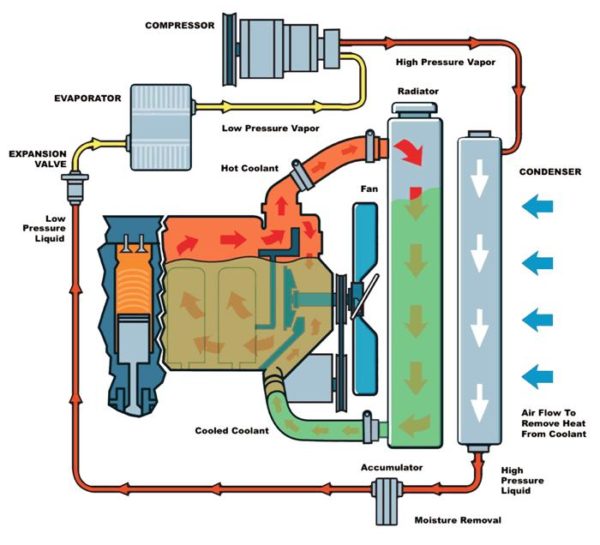Understanding Your Car's Cooling System: A Simple Guide
Ever wondered what keeps your car's engine from overheating? It's the engine cooling system, a crucial component that ensures your engine operates at the optimal temperature. Without it, your engine would quickly overheat, leading to significant damage and costly repairs. This article explores the workings of the engine cooling system, highlighting its importance and providing practical tips for maintaining its effectiveness.
Imagine your car's engine as a miniature furnace, generating immense heat as it burns fuel. This heat, if unchecked, can warp metal components and cause catastrophic failure. The engine cooling system acts like a thermostat, regulating the engine's temperature and preventing overheating. It's a continuous cycle of absorbing and dissipating heat, ensuring your engine performs reliably.
The fundamental principle behind engine cooling is heat transfer. The system absorbs excess heat from the engine and releases it into the surrounding environment. This process involves a network of components working in harmony, including the coolant, water pump, radiator, thermostat, and hoses. Each part plays a vital role in maintaining the engine's operating temperature.
Early internal combustion engines relied on simple air-cooling systems. However, as engines became more powerful, the need for more efficient cooling solutions became apparent. The development of liquid-cooled systems marked a significant advancement, allowing for better temperature control and improved engine performance. These systems, which circulate coolant through the engine block, are now the standard in most vehicles.
A properly functioning cooling system is essential for engine longevity and performance. Overheating can cause severe damage, including warped cylinder heads, cracked engine blocks, and damaged pistons. Regular maintenance of the cooling system, such as checking coolant levels and inspecting hoses for leaks, is crucial to prevent these costly repairs.
The cooling process starts with the coolant, a mixture of water and antifreeze, circulating through passages within the engine block. As the coolant flows through these passages, it absorbs heat generated by the engine. The heated coolant is then pumped to the radiator, a heat exchanger located at the front of the vehicle.
Inside the radiator, the coolant flows through thin tubes, while air passes over the outside fins. This air flow, often aided by a fan, cools the coolant, which then returns to the engine to absorb more heat. The thermostat, a valve that regulates coolant flow, ensures the engine reaches and maintains its optimal operating temperature. It opens when the engine is hot, allowing coolant to flow to the radiator, and closes when the engine is cold, restricting coolant flow and helping the engine warm up quickly.
Benefits of a well-maintained cooling system include improved fuel efficiency, reduced emissions, and extended engine life. A properly cooled engine operates more efficiently, leading to better fuel economy. Lower operating temperatures also reduce the production of harmful emissions. And by preventing overheating, the cooling system helps prolong the life of the engine, minimizing the need for costly repairs.
Advantages and Disadvantages of Liquid Cooling Systems
| Advantages | Disadvantages |
|---|---|
| More efficient cooling than air-cooled systems | More complex and requires more maintenance |
| Allows for quieter engine operation | Potential for leaks and corrosion |
| Contributes to better fuel efficiency | Can be more expensive to repair |
Best Practices: Regularly check coolant levels, inspect hoses for leaks, and have the cooling system flushed and refilled according to the manufacturer's recommendations. Ensure the radiator cap is secure, as it maintains pressure within the system. Address any leaks promptly to prevent overheating. Pay attention to unusual temperature gauge readings and have them checked by a mechanic if necessary.
FAQs: What is coolant? Coolant is a mixture of water and antifreeze that helps regulate engine temperature. Why is my car overheating? Overheating can be caused by various factors, including low coolant levels, a faulty thermostat, or a malfunctioning water pump. How often should I check my coolant? It's recommended to check your coolant level at least once a month. What should I do if my car overheats? If your car overheats, pull over to a safe location, turn off the engine, and let it cool down before checking the coolant level. If the level is low, add coolant if available. If not, contact a mechanic. What is the purpose of the thermostat? The thermostat regulates coolant flow to ensure the engine reaches and maintains its optimal operating temperature. Why is it important to maintain the cooling system? A properly maintained cooling system ensures optimal engine performance, prevents overheating, and extends engine life. What are signs of a failing cooling system? Signs of a failing cooling system include overheating, leaks, low coolant levels, and unusual temperature gauge readings. How can I prevent cooling system problems? Regular maintenance, including coolant checks, hose inspections, and flushing, can help prevent cooling system problems.
The engine cooling system is vital to the health and longevity of your car's engine. By understanding how it works and following recommended maintenance practices, you can ensure your engine runs smoothly and efficiently for years to come. Regular checks, prompt attention to potential issues, and adherence to best practices will contribute to optimal engine performance and prevent costly repairs. Understanding the intricacies of this crucial system empowers you to take proactive steps in maintaining your vehicle's health, saving you money and hassle in the long run.
The rise and fall of amv culture on youtube
Convenient healthcare exploring walmart pharmacy clinic options in hopkinsville ky
Level up your online duo a guide to anime boy matching pfps













